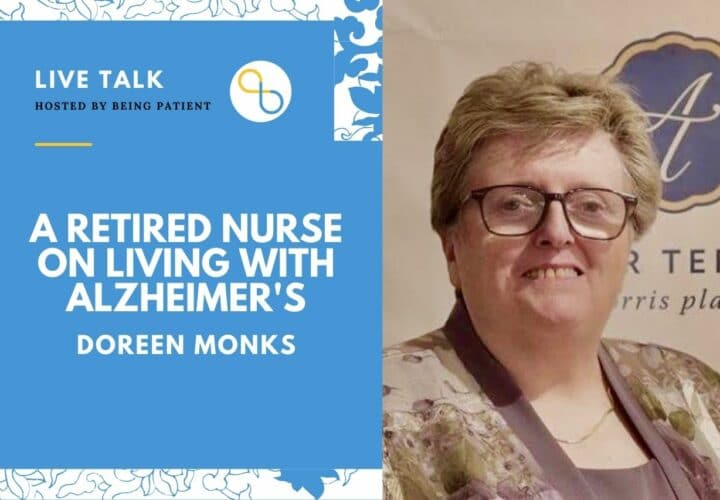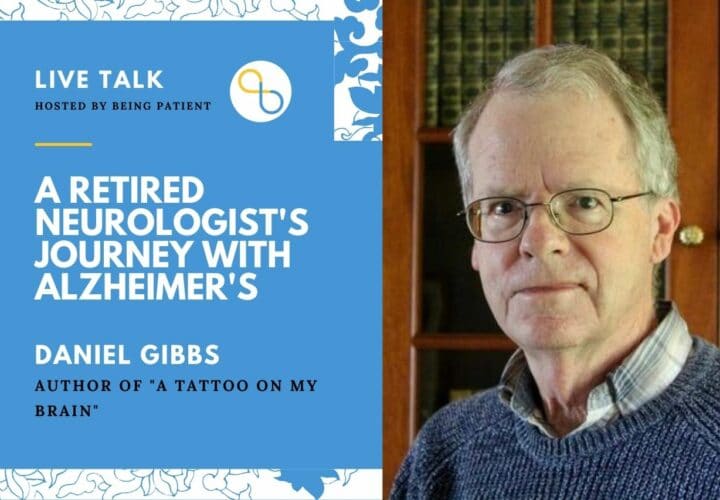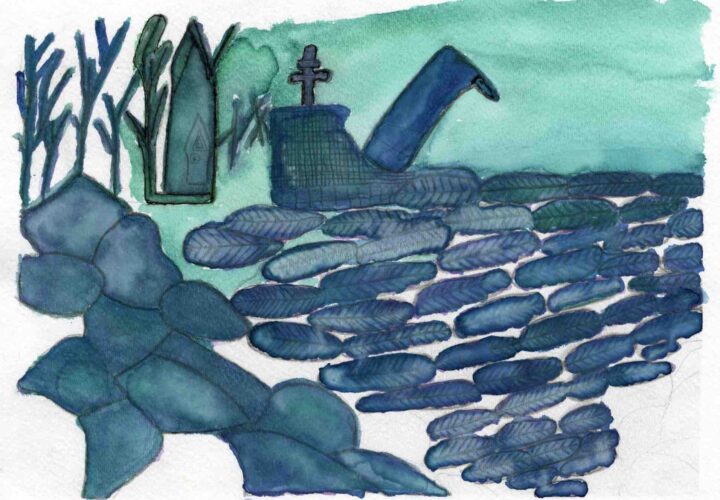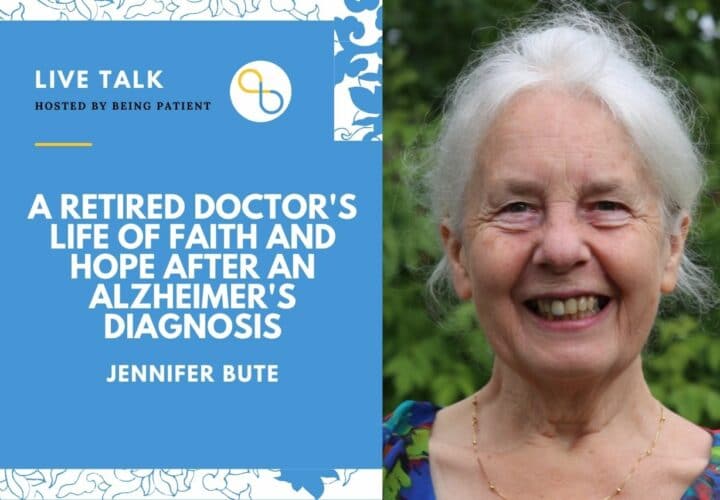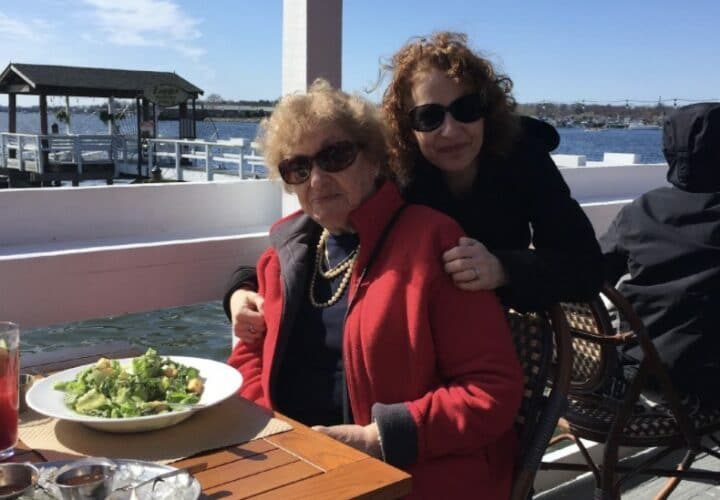Diagnosed with early-onset Alzheimer’s at 63 years old, Doreen Monks shares her insights on paving a new path in her life.
Doreen Monks never expected to retire as a nurse practitioner at the age of 63. Taking care of stroke patients was her passion. But life has a way of throwing curveballs, and Monks’ world was upturned by her diagnosis of early-onset Alzheimer’s. Transitioning into early retirement was by no means easy, but Monks has since found a new mission of advocating for people living with Alzheimer’s, and to show others what it means to live a fulfilling — albeit different — life after a diagnosis.
Being Patient spoke with Monks about her early symptoms of Alzheimer’s, and what brings her joy and content in her life following retirement.
Being Patient: What did your work as a neuroscience nurse practitioner entail?
Doreen Monks: I developed a stroke program at a local medical center, so most of my time was spent with stroke patients. My focus was on stroke care and management, prevention and treatment. It was not unusual to see patients with vascular dementia, which is I believe the most common form of dementia after Alzheimer’s. As a bedside nurse I frequently cared for patients with some form of dementia.
“You’re going to have to make adaptations to life
as you go along. But that doesn’t mean today,
you can’t have a good day. You can. I miss
the old life but I’m happy with the new life.”
Being Patient: When did you start experiencing symptoms of Alzheimer’s?
Doreen Monks: In retrospect, it was probably when I was about 60. My memory remains fairly intact, given that I’m going to be 69. It mostly has to do with executive functions, so putting order to things, following up on complex processes. Those became problematic and I was having more difficulty at work, particularly with administrative issues.
I was lucky. I worked with a neurologist, one of the best neurologists I’ve ever known. She was the one who literally knocked on my door one morning and said, ‘We have to talk.’
She said, ‘These are some of the things that I’m seeing and I’m concerned that you’re having some cognitive issues.’ I will be forever grateful to her because it brought about the diagnosis much earlier than most people are diagnosed.
Being Patient: Before you were diagnosed, did you have any inkling of what was wrong?
Doreen Monks: I was getting more and more frustrated with the administrative work. I thought at first it was because I didn’t like it. But then an interesting thing happened. I had a study coordinator who worked for me and we were involved in a drug research study. She came in looking for this check, [a stipend for a study participant], and I said, ‘No, we haven’t gotten it yet.’ She came back a week later and I said, ‘No, we haven’t gotten it. You better call and see what happened.’
She came back rather sheepishly and said, ‘Doreen, not only did we get the check, you deposited it.’ To this day, I have no recollection of that. On my desk was a folder where I had the slip, but it never dawned on me that the next logical step to the question is: look in the folder and you’ll find the deposit slip.
One time, I couldn’t remember how many seconds were in a minute. I had to look it up. One time I couldn’t remember what finger I put my ring on. My mother bought me a Claddagh ring when I got my master’s degree in 78’. I put it on the same finger since then. One morning, it took me 20 minutes to figure out what finger I put the ring on. There’s little glitches when at first you think it’s nothing, but you put them together, and obviously it’s something.
Being Patient: It took about one and a half years until you received your final diagnosis of early-onset Alzheimer’s in 2016. Can you share with us your experience during this diagnostic process?
Doreen Monks: We had the discussion about the symptoms on Thursday. Monday, I went to my primary care physician, which is really the first thing you have to do. I’m blessed with a phenomenal primary care physician. She said, ‘I’m not a neuropsychologist, so here’s what we’re going to do. You’re going to go for an MRI (magnetic resonance imaging), and you’re going to go see the neuropsychologist.’
That was the beginning of the process. After the neuropsychological exam, I then went to get a neurologist, [and I received] multiple scans, blood work. In the beginning, they rule out anything that can be fixed. So all those things that could be excluded were excluded.
I went for a PET (positron emission tomography) scan about a year and a half after this process started, and I got back to the hospital where I was working. As I started pulling into the parking lot, I got a text from the physician who said, ‘Call me.’
I called him. He said, ‘I’ll call you right back.’ He called me right back and he said, ‘It’s Alzheimer’s disease. I’ll see you next week in the office.’ That was how I got my diagnosis.
I texted my neurologist friend and the NP (nurse practitioner) that was a friend of mine. [My neurologist friend] said, ‘I’ll meet you in my office and we’ll look at the PET scan together.’ I got the support I needed from them, so I didn’t need help [from the neurologist who officially diagnosed me].
Being Patient: How did you react to your PET scan results?
Doreen Monks: It was startling. The PET scan measures the uptake of glucose activity in your brain. In areas that aren’t functioning, there’s no glucose, so I basically have these black holes in my brain. The neuro person in me said this is fascinating. but as the patient, I thought, ‘Oh my God, I can’t believe this is my brain.’
“You get the diagnosis
and literally the world stops,
and it’s a clean slate now.”
But I was happy at that point to have an answer, because we went back and forth, back and forth: Is it Alzheimer’s? Is it frontotemporal dementia? Is it something else? It was almost a relief to fInally to have an answer because then I knew what I was fighting. I knew who the enemy was.
Being Patient: Shortly after, you retired as a nurse practitioner. How did you manage this transition?
Doreen Monks: I’m a single woman. My work was my passion. I certainly wasn’t expecting to retire at 63. You get the diagnosis and literally the world stops, and it’s a clean slate now. Whatever you were looking forward to or however you visioned your life, that’s all gone. Whatever five-year plan, two-year plan or one-year plan is out the window. Now you have to start all over again and reset your life going forward.
I realize I have two choices. I am either going to sit on a wallow in the corner and wait for the archangels to come or I’m going to do something about it, and I learned a different life. I have found a new passion and that’s all things Alzheimer’s. I feel very blessed in some way that I was diagnosed early. I’m highly functional. I’m independent in most things. Anything that’s stressful is taken care of by my friends. Early on in my diagnosis, [I put together my] living will, health care proxy, all those things that you have to worry about at the end.
If you plan for the bad end, then you get to live the good part. You can have a good life. It’s a little different. It’s not the same life you thought you were going to have and it may take a little more work. I’m not saying that things don’t progress because the disease will progress. You’re going to have to make adaptations to life as you go along. But that doesn’t mean today, you can’t have a good day. You can. I miss the old life but I’m happy with the new life.
Every day I get up, I think it’s going to be a good day. I go out with my friends. I go to meetings. I do some lectures. So there’s a new passion in my life and I’m very grateful for that.
Being Patient: Any last thoughts that you would like to add?
Doreen Monks: I think the key with this disease is early diagnosis. Too many times people are diagnosed when the disease is fairly advanced. It behooves your health care provider to do early screenings. Once a year we do an EKG (electrocardiogram), a lipid [panel], a stress test, and we do this and that. Why aren’t we doing at least a mini-mental [state] exam once a year?
The other thing is somebody goes to the doctors and they say, ‘I’m a little concerned about my memory or it’s hard for me to do things.’ The response too many times [from doctors] is, ‘Oh don’t worry about it, you’re okay, or that’s normal, you’re getting older.’ Well, dementia is not a normal process of getting older. Certainly primary health care providers need to be more cognizant and accepting.
The interview has been edited for length and clarity.
Contact Nicholas Chan at nicholas@beingpatient.com
